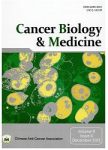Advances in caring for the older cancer patient:a report from the 2015 conference of the International Society of Geriatric Oncology
Advances in caring for the older cancer patient:a report from the 2015 conference of the International Society of Geriatric Oncology作者机构:Freelance Medical Writer Charlbury OX7 3HJ UK
出 版 物:《Cancer Biology & Medicine》 (癌症生物学与医学(英文版))
年 卷 期:2016年第13卷第1期
页 面:150-155页
核心收录:
学科分类:1011[医学-护理学(可授医学、理学学位)] 10[医学]
主 题:Geriatric oncology supportive care elderly geriatric assessment quality of life comorbidities
摘 要:A paradox in cancer research is that the majority of patients enrolled in clinical trials are relatively young and fit while typical patients in daily practice are elderly and have comorbidities and impaired organ function. Given these differences, many major studies provide an imperfect guide to optimizing the treatment of the majority of patients. Since cancer incidence is highly correlated with age, and since the world s population is rapidly ageing, this problem can only increase. For this reason, oncologists and geriatricians need to collaborate in developing tools to systematically assess the health status of elderly patients and their fitness to receive cancer therapies of various intensity. Tailoring anti-cancer treatments and supportive care to individual needs should be seen as part of the move towards personalized medicine. Achieving this goal is as much of a challenge to developing and middle-income countries as it is to western nations. The 2015 annual conference of the International Society of Geriatric Oncology(SIOG) held in Prague, Czech Republic, November 2015 and had a global focus on advancing the science of geriatric oncology and supportive care. Central to this approach is the systematic assessment of life expectancy, independent functioning, and the physical and psychological health of older cancer patients. The assumption behind comprehensive geriatric assessment is that elderly cancer patients have complex needs. The implication is that effective intervention will require a multidisciplinary team. Examples of effective geriatric assessment, multidisciplinary working and supportive care were presented at the SIOG conference.



